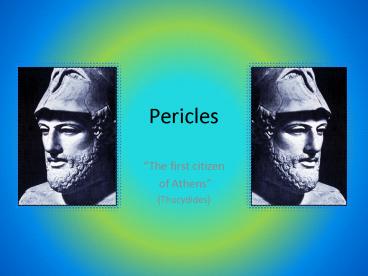Pericles PowerPoint PPT Presentation
1 / 9
Title: Pericles
1
Pericles
- The first citizen
- of Athens
- (Thucydides)
2
Early Life
- Born in 495 BC to a powerful Athenian family.
- A few nights before his birth, his mother dreamed
she had borne a lion. This was interpreted as a
sign of greatness by some, but it may have been
because of his unusually large skull.
- Name means surrounded by glory
- Took education seriously and devoted most of his
time to studies
- Had an interest in philosophy and art at an early
age
3
Sophocles
Status/people
Studied under sophist and master of music, Damon.
Friends with important people like Sophocles,
Herodotus, Phidias, Socrates, and Protagoras.
Studied under the philosopher Anaxagoras.
Studied under Zenon.
Herodotus
He was recognized by the Athenians as being
dignified, eloquent, upright and patriotic.
He was from an aristocratic family, but was the
leader of the peoples party.
Socrates
4
Influence on Architecture
He commissioned the building of the Parthenon and
several other monuments.
He wanted Athens to be the most glorious city in
Greece, so he hired talented artists and
sculptors to decorate it.
He believed Athens had the best government and
the noblest people. The monuments would prove
Athens superiority to other Greek city-states.
Gave employment to the poorest citizens by having
them build monuments like the Parthenon.
Parthenon
5
Government and Politics
Pericles was very involved in politics and wanted
democracy in Athens.
He was a skilled politician and a gifted public
speaker.
He was elected one of the citys generals in the
460s BC. He was reelected many times after that.
He was the most influential politician in Athens
for many years.
He encouraged participation in government by
introducing payment for those who served in
public offices or juries. He also encouraged
Athenians to introduce democracy in other parts
of Greece.
He challenged the aristocrats who thought money
and influence gave them the right to rule.
Pericles father of Athenian democracy
6
Leadership
He was later suspended from the office of
strategos as he was found guilty of theft. He was
also fined.
Led Athens from 461 to 429 BC
Rebuilt Athens following the Persian War
He was needed badly so was re-instated but died
shortly after.
Elected strategos (general) for 29 years
Model of Pericles leading Athenians into battle
7
Peloponnesian War
Delian League (led by Athens) vs. Peloponnesian
League (led by Sparta)
People fighting in the Peloponnesian War
Pericles led Athens in the first two years of the
Peloponnesian War.
He devised the Athenian strategy of withdrawing
into the city walls. The navy would bring food
and supplies to Athens even if Sparta surrounded
the city.
This plan led to his death. Overcrowding in the
city led to a plague outbreak, which Pericles
eventually died from in 429 BC.
8
Legacy
Pericles is remembered by the literacy and
artistic works of the Golden Age, because he is
known for promoting art and education. Many
believe the acropolis was his greatest
achievement as it is a lasting reminder of the
greatness he brought to Athens. The Parthenon is
also a large part of Pericles legacy.
Although Pericles was interested in democracy
during his life, some argue that a basic element
of Pericles legacy is imperialism, which denies
true democracy and freedom to the people of all
but the ruling state. Pericles did say that he
wanted everybody to take place in government, but
he was mostly talking about all free men in
Athens, limiting women, slaves, children, and
people in the other city-states.
Pericles Sculpture in Athens
9
Works Cited
Pericles. Wikipedia The Free Encyclopedia.
23p. 3 Feb 2008, Online, Internet, Feb 4, 2008.
lthttp//en.wikipedia.org/wiki/Periclesgt.
Pericles. www.in2greece.com. 2p. Online,
Internet, Feb 5, 2008. lthttp//www.in2greece.com/
english/historymyth/history/ancient/pericles.htmgt.
Ramirez, Susan Elizabeth, Peter Stearns, Sam
Wineburg. World History Human Legacy. Orlando,
Austin, New York, San Diego, London Holt,
Rinehart, and Winston, 2008.

